You can read about Robin's current progress in the Son-Rise therapy on this
page: what changes are in his behaviors, what changes are in our whole family.
As priority No. 1 is therapy itself, I don't have very much time for
translating, so I update English version only from time to time. Sorry for
that. I hope you will find this information interesting.
After our return home from the course, we were very excited about the therapy.
We first tried to do it ourselves - though volunteers will be necessary for
full programme, first we have to know how to play with Robin before we learn it
our volunteers. This period longed about one month.
Firstly Robin was unhappy in the playroom. We were totally changed -
enthusiastic, loud, excited. It was a change for him. We had to slow down a
little. After few days we recognized that our first aim would be to be happy in
the playroom - both we and Robin.
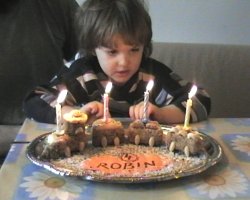 We achieved this goal after few days. We didn't ask him very much, but praised
him for evey look at us. He didn't look at us very much, his eye contact before
SonRise was rather poor. We oriented our games with him to encouraging the eye
contact and to join him in his repetitive behaviors - izms. These were rolling
into the carpet and doing anything with slippers.
We achieved this goal after few days. We didn't ask him very much, but praised
him for evey look at us. He didn't look at us very much, his eye contact before
SonRise was rather poor. We oriented our games with him to encouraging the eye
contact and to join him in his repetitive behaviors - izms. These were rolling
into the carpet and doing anything with slippers.
After few weeks we recognized that we can go further. Robin's eye contact
improved tremendously. He became aware that it works - when we played and he
had looked at us, we did everything he wanted. He was content in the playroom,
although wanted to go out a lot.
We began to look for volunteers. After about month of seeking we had 5
volunteers - 5 excellent people.
After 5 weeks of our own trials we welcomed Son-Rise child facilitator Linda
for 2-day session. Linda showed us how she plays in the playroom and we had a
lot of discussions about details with her.
Among other things, Linda is great person and we became very good friends. But
what was the best: she explained us that it is no longer necessary to only join
to Robin's play. She said that his eye contact was simply great and he is ready
to learn to speak!
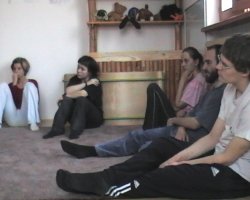 Other Linda's observations were: Robin is able to play as 4-year old boy. Robin
hears!!! We never exactly knew whether he hears or doesn't. An objective
examinations showed that he hears almost nothing (90 dB in the right and 115 in
the left ear). Linda saw that he simply hears...! We believed her because it
fitted to our own observations. And more - he understands probably everything!
Other Linda's observations were: Robin is able to play as 4-year old boy. Robin
hears!!! We never exactly knew whether he hears or doesn't. An objective
examinations showed that he hears almost nothing (90 dB in the right and 115 in
the left ear). Linda saw that he simply hears...! We believed her because it
fitted to our own observations. And more - he understands probably everything!
We wrote down 10 words we would be going to learn him. And the main change was
shift from joining him (what we had been doing nearly all the time) to building
the speech.
We began to learn new style of play. It was once more very enthusiastic, full
of energy and excitement. We praised him for every eye contact, but we also
asked him to say words.
At the beginning of April, after 2 months of SonRise program, we have a great
team of 6 volunteers. Robin is approximately 7 hours a day in the playroom.
After 13 weeks of program, these changes can be observed in Robin's behavior.
This is of course only very short summary of what we observe and live.
General observations: 
-
His eye contact is great. He looks at us nearly every time we ask him. He looks
at us very often spontaneously.
-
He is creative - he is able to invent new games!
-
He almost no longer does 'izms'. Very rarely he does them, always maximally for
few minutes.
-
At the beginning, it was sometimes problem to get Robin into the playroom, he
wanted to go out a lot. Now it is sometimes problem to get him out.
-
Robin draws - he never did. See his picture of Maggie.
Hearing and understanding the speech:
-
Robin hears very silent sounds - such as tapping of the rain on the window
parapet, moving the car outside the house.
-
We experienced a lot of situations where he obeyed our request - such as "Bring
me the paper", "Put it on its place" and so on. We are totally convinced that
he hears and understands everything.
Language and communication:
-
Robin says 6 words as a request to us spontaneously! This is true and authentic
communication! It is when he wants something from the shelf - these six words
(well, of course their Slovak equivalents :-)) he asks for spontaneously: car,
doll, slipper, chalk, horse, drink (when he wants to drink). Most of the words
are not clean, only we can understand them.
-
He spontaneously comments while playing about other 5 words.
-
Words said on request - about 60 words!
-
Robin said few times abstract words: me too, my, I have!
-
He joined two words twice: car, run!
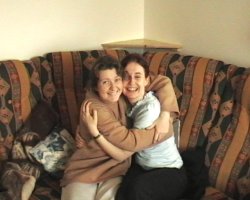 It is now just a few days after the second Linda's visit. She saw all the awful
changes and shifted our program a little again. Simply said, we encouraged
Robin to say words more than to encourage communication. What we want is to
communicate, not just say words. Robin is great - he looks at us, he began to
speak, he plays games he never did. What we are going to focus now is
encouraging using only few words (13 in fact), but in communication. And we
will try also to learn him to say them more clearly.
It is now just a few days after the second Linda's visit. She saw all the awful
changes and shifted our program a little again. Simply said, we encouraged
Robin to say words more than to encourage communication. What we want is to
communicate, not just say words. Robin is great - he looks at us, he began to
speak, he plays games he never did. What we are going to focus now is
encouraging using only few words (13 in fact), but in communication. And we
will try also to learn him to say them more clearly.
What I can say now is that the program is really great thing. We see - for the
first time - that Robin speaking, Robin speaking in sentences - is not just
dream. It is our future!
Our Son-Rise program runs since February, 2004. It is 15th of August and we
have decided to make some summary of changes we can see in Robin - and in us as
well.
1. Isms
Robin demonstrated a good deal of repetitive selfstimulating behaviors (isms)
before our Son-Rise program. He rolled himself into carpets, switched on and
off lights for a very long time. He couldn't be without his favourite toys -
home slippers. He gazed often and opened and closed doors.
We can say today, that isms are almost entirely gone. He does nothing
from above mentioned, neither it is his object of interest. He needs rest when
we are bombarding him with stimuli, and sometimes stares to walls or just lies
on his mattress, these are though not isms - selfstimulating and repetitive. He
make rituals in some games (he wants us to play them according to his
thought-out pattern). As a whole, he is withdrawn about ¼ of the time in
playroom, and interactive the rest of time.
2. Hearing
Before starting our Son-Rise program, we were convinced that Robin doesn't
hear. Also objective examination showed that he didn't. Whether it was so in
that time - we will probably never know.
We know today, that Robin hears - and hears normally. It doesn't mean
that he always responds, but he responds much more often and he mainly reacts
to so slight sounds that it is clear that his not-hearing is just
"switching-off", not hearing insufficiency.
3. Eye Contact
Before the Son-Rise, his eye contact was minimal. Maximally for a few seconds,
but this was very, very seldom. In general he didn't look at us or anybody
else.
Today, his eye contact is great. When he is engaged in a game, the eye
contact is in fact permanent. When he is a little bit tired and lies on his
mattress, he still looks at us, if we horse around. The change in eye contact
came in the very early stage of our program and it was tremendous. Since then
we observe only permament improving. Moments when he doesn't want to look can
be counted to about 5-10% of the time in the playroom.
4. Communication and Speech
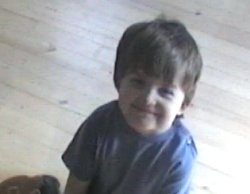 Before the Son-Rise, we couldn't imagine that Robin would laugh. His
communication was only pulling our fingers (without eye contact) towards an
object he wanted to manipulate. We weren't sure in fact, if this is
communication - maybe it was only manipulating our hands as tools. Robin has
learned gesture-speech (because he was deaf). He knew a lot of them, but was
never able to use is meaningfully, or any other way. He never used them with
exception of maybe two times when he showed some gesture to himself when he saw
the object. He never asked for anything. His communication - except pulling our
fingers - was none.
Before the Son-Rise, we couldn't imagine that Robin would laugh. His
communication was only pulling our fingers (without eye contact) towards an
object he wanted to manipulate. We weren't sure in fact, if this is
communication - maybe it was only manipulating our hands as tools. Robin has
learned gesture-speech (because he was deaf). He knew a lot of them, but was
never able to use is meaningfully, or any other way. He never used them with
exception of maybe two times when he showed some gesture to himself when he saw
the object. He never asked for anything. His communication - except pulling our
fingers - was none.
We can say today, that Robin communicates. The initiative is on us most
of the time, but sometimes he initiates the game. We are laughing a lot in the
playroom - together. He asks for his favourite plastic animals by their name.
He leads us to do what he wants in many games (throw, run, fly...). He often
wants to go to the playroom, he is fond of this room. His speech is in one-word
sentences yet and is not clean - stranger wouldn't probably understand a lot.
But words now have their sense for Robin - the speech which not only serves for
communication, but creates conceptual language in head and therefore is basis
of thinking - this speech is something Robin definitely acquires.
There was one exercise on StartUp course which result was to imagine something
totally unbelievable what we would like our child to acquire in 6 months. I
tried to imagine something really inconceivable - Robin's ability to answer
yes/no meaningfully. Today, after half a year, I can state that he is able to
show his will as a answer to my question. Well, it is not in fact spoken yes/no
(although he said it a few times), but his response is detectable.
What remains the same yet, is his willingness to be alone. He doesn't withdraw
to solitude, but when we leave him, he doesn't express any will not to be alone
and is able to play by himself for a long time.
5. Changes In Us
Son-Rise is not just about curing our child. It is mainly about the attitude,
love and acceptance - and we can say that 'giving' is unambiguously mutual. Not
only us, also our volunteers (we call them our adventurers) expressed the idea
that Robin gave us so much. We have grown from tired, often desperate,
pessimistic people into content and happy (though ofter tired :-)) ones.
Even
if we move no other step further, even if Robin decides to goes back, we know,
that we are on the right way and we would be grateful for it. We know
today, that it is not us who cure Robin - it is he himself. We just help him on
his journey. He has manifested enormous will to fight extremly difficult issues
which other children could find automatic. We believe that Robin will persist.
Our goals are very high, but we are no longer dependent on their achieving -
and this gives us unbelievable freedom. We have no longer have to be realistic
because if we expect too much, we can be dissapointed. We expect miracles - and
sometimes they fulfil. We have the hope and it gives us - and to Robin as well
- the wings.
Bears, Samahria, Bryn and William, if you are reading this -
THANK YOU!
When I was thinking about how to write this summary, I decided to do it as FAQ.
FAQ as a usual part of many web pages is characteristized by a very specific
interpretation of this phrase because in most cases the questions are posed by
author himself (herself).
How would you assess general changes since beginning of the program?
Well, everything we observed in half-year-estimation is still true. In the
second half-year, we recorded two "rest times", typical by a decline of Robin's
interest, interaction and speaking. But he always went through it.
What has changed in the second half-year?
So, what is new:
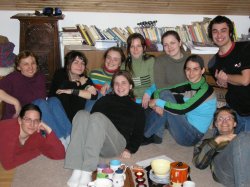
-
Robin clearly demonstrates that he wants human contact. Even in the
rest-times, he wanted to be in his playroom, even though then he lied down and
didn't need us. He likes to be in the playroom with us, he wants us. One year
ago he was upset when we had two visitors (he even got ill several times from
it). Today, when a group of 6 volunteers come, he invites them with wide smile.
-
Robin's attention and interaction reaches estimated 80-90%, sometimes
even 100% in the best times.
-
As for communication, he sometimes uses two-word sentences. It seems
that he is going through barriers.
-
Robin is clearly open to new cues. We have stated that he awaits for new
stimuli, he is often bored from old games and wants new ones.
-
This is not new, but it was too early to estimate it in the first half-year.
Robin has to get no antibiotics since beginning of the program. While it was
for him like sweets, this is very pleasant change (in the first year of his
life, he had it 14 times, then about 5 times a year).
-
On the other hand, our biggest goal - speech clarity - was not reached. It is
obviously big issue for him.
The program has been running one year. Isn't it enough?
Nope :-).
I got recently an email in which one woman writes about her daughter working
with autistic child in England with Son-Rise method. They are working with this
boy already for many years. She writes: "I was in the family last year and I
was charmed by the boy. It is very intelligent child and he is lucky to have so
magnificent mother, grandma, grandpa and the team of people working with him."
This percieving is typical for Son-Rise programs: we don't have to have always
amazingly quick results. Our goals are very high but we are not dependent on
achieving them. Every teeny approaching nearer to the world of our son is
meaningful and worth the effort. And outcome of it is beautiful child and
beautiful attitude towards the world.
Is so long-term program worth the effort?
Yep :-).
I like to remember one moment from the StartUp course when Bryn told the nice
story from one of the previous courses. One mother, listening about how her
life is to be changed if she wants to do Son-Rise, amazedly asked, "But this
will not be normal life at all...?". Bryn answered her with smile, "As if
anything in your family is normal." (This is so accurate that only people
knowing how it seems in the family with autistic child will understand.)
The Son-Rise program is the very best we can do. An alternative to program is
not contemplation and puffing from pipes. An alternative would be just
conscionsness that Robin will never meaningfully grow. The life with autistic
child is always challenging. And in the program - we have still progress, we
are enjoying life, changing program to do maximum we are able to. We have no
certainty that he will fully recover, but we still have real hope.
And what next?
Well, we will work further on the program with Robin - and work on ourselves.
This is part of Son-Rise as well, the progress is mutual. And all of us can
only gain in this process.
This time, it is not so easy to write about long-term progress. In the second
year of our program, there were several milestones in our path:
Biochemistry and metabolism - Dr. Smarda
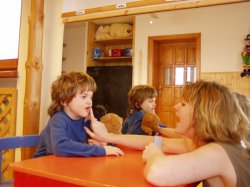 Somewhere in March 2005,
when Robin had one of his more difficult periods, he had also unusual problems
- he was very weepy, something hurted him. After long observation we agreed
that is was stomach. It was not going to become better. It moved us towards one
way we were considering for some time - dealing with problems with his body
from biochemic and metabolic point of view.
Somewhere in March 2005,
when Robin had one of his more difficult periods, he had also unusual problems
- he was very weepy, something hurted him. After long observation we agreed
that is was stomach. It was not going to become better. It moved us towards one
way we were considering for some time - dealing with problems with his body
from biochemic and metabolic point of view.
We began to attend Dr. Smarda which we knew thanks to other autistic children.
He is a very specific person. He is the kind of specialist which tells you
everything he knows but you get lost in his second sentence because what is
basic information for him, common physicians don't know. His scope is (beside
others) human biochemistry - after in-depth analysis from the blood, urine and
other human liquids and non-liquids he has got a plenty of numbers in which he
can read more about you than you will ever know. And then he prescribes cure -
products that correct your metabolism.
This way, we found out about absolutely corrupted iron metabolism in Robin,
awful level of aluminium in his blood and other delicacies. These are things
that have very big potential to directly influence brain operation. We had
surprisilngly good results in food intolerancies tests.
Today, after 3/4-year of this cure, Robin is from the metabolic point of view
in the half of his path. Almost everything has dramatically improved which
results in his physical health - he began rapidly to grow; corticoids that were
prescribed to him for the rest of his life, are today just past and his
immunity is unbelievable - if some virus catches all of us, when it notices
Robin, it runs away screaming. On the other hand, we are still waiting for
improvment of his perceptiveness and willinghess to participate.
What is Robin like after two years?
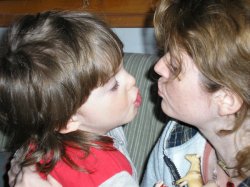 I have truthfully to say that in the second year of our therapy, progress was
very slow. What Robin achieved before is still true - meaning that he didn't
forget anything - but we began to loose contact. We know that everything he
already did, he still knows how to do, but he lost interest. Old games are no
longer working and new ones didn't attract him.
I have truthfully to say that in the second year of our therapy, progress was
very slow. What Robin achieved before is still true - meaning that he didn't
forget anything - but we began to loose contact. We know that everything he
already did, he still knows how to do, but he lost interest. Old games are no
longer working and new ones didn't attract him.
Robin often seems to be bored by old things because he is too old for simple
games, but as if he is unwilling or unable to accomodate new, more complex
games. In the most difficult times, we lost almost completely eye contact as
well. It is difficult to attract him with game when we see that he "switched
off" - doesn't listen, doesn't look.
On the other hand, he still has moments when he is attractable. In the autumn
2005, he had one beautiful month: he found interest in books, this time not
only to tear them. He wanted to investigate pictures with us, wanted us to say
names of animals and people in pictures. We literally felt how he absorbed
information.
In essence, we had progress almost all the time, but at the same time, we got
to the mental state in which we were before the Son-Rise.
Changes in ourselves
After half year of our program, when I wrote "Changes in us", it was very
optimistic part. I thing that although we percieved our life exactly as I
wrote, we are not at all so perfect as it probably seemed. After slowing down
of the progress, after simplyfing our family budget thanks to biochemical cure
and after long period of being confused and unhappy from everything - from
Robin, from ourselves, from the life, we found ourselves in a very similar
state of mood we were long time ago.
So, one long-term visitor settled in our home - the depression. And we are
againg learning - learning to be happy even when Robin is discovering new ways
how to make our life adventurous, how to be happy even if the spouse is
hopeless... It is not easy, but I believe that it is very necessary. When you
are unhappy, you can not help anybody, neither your spouse, nor your son, nor
yourself.
Son-Rise: Hope continues
So we have very recently made the decision: the next Son-Rise course - Maximum
Impact. It is focused mainly on the work with parent than their autistic
children, what is exactly what we need. We are looking for further period -
perhaps this work on ourselves is one of the main reasons why we have so
special son.